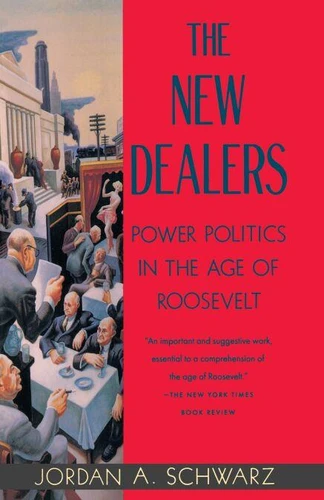The New Dealers. Power Politics in the Age of Roosevelt
Par :Formats :
Disponible dans votre compte client Decitre ou Furet du Nord dès validation de votre commande. Le format ePub protégé est :
- Compatible avec une lecture sur My Vivlio (smartphone, tablette, ordinateur)
- Compatible avec une lecture sur liseuses Vivlio
- Pour les liseuses autres que Vivlio, vous devez utiliser le logiciel Adobe Digital Edition. Non compatible avec la lecture sur les liseuses Kindle, Remarkable et Sony
- Non compatible avec un achat hors France métropolitaine
 , qui est-ce ?
, qui est-ce ?Notre partenaire de plateforme de lecture numérique où vous retrouverez l'ensemble de vos ebooks gratuitement
Pour en savoir plus sur nos ebooks, consultez notre aide en ligne ici
- Nombre de pages432
- FormatePub
- ISBN978-0-307-80069-5
- EAN9780307800695
- Date de parution06/07/2011
- Protection num.Adobe DRM
- Taille2 Mo
- Infos supplémentairesepub
- ÉditeurVintage
Résumé
This bold new analysis of the New Deal dramatically revises our vision of the Roosevelt legacy -- and of the new relation between government and business it made a central fact of American life. With impressive scholarship and narrative brio, Jordan A. Schwarz persuasively demonstrates that the New Deal's architects sought not merely to save an endangered American capitalism but to integrate economically underdeveloped regions of the nation within the scope of a dynamic state capitalism capable, after World War II, of dominating the global marketplace.
As he assesses the contributions of such figures as Supreme Court Justice Louis D. Brandeis, the legal and political "fixer" Thomas G. Corcoran, Texas legislators, Sam Rayburn and Lyndon Johnson, and the quintessential New Deal industrialist Henry Kaiser, Schwarz produces a volume that should be required reading for anyone concerned with current American industrial policy. And he does so with a liveliness and depth of insight that make The New Dealers comparable to the best work of Arthur Schlesinger or Robert Caro.
As he assesses the contributions of such figures as Supreme Court Justice Louis D. Brandeis, the legal and political "fixer" Thomas G. Corcoran, Texas legislators, Sam Rayburn and Lyndon Johnson, and the quintessential New Deal industrialist Henry Kaiser, Schwarz produces a volume that should be required reading for anyone concerned with current American industrial policy. And he does so with a liveliness and depth of insight that make The New Dealers comparable to the best work of Arthur Schlesinger or Robert Caro.
This bold new analysis of the New Deal dramatically revises our vision of the Roosevelt legacy -- and of the new relation between government and business it made a central fact of American life. With impressive scholarship and narrative brio, Jordan A. Schwarz persuasively demonstrates that the New Deal's architects sought not merely to save an endangered American capitalism but to integrate economically underdeveloped regions of the nation within the scope of a dynamic state capitalism capable, after World War II, of dominating the global marketplace.
As he assesses the contributions of such figures as Supreme Court Justice Louis D. Brandeis, the legal and political "fixer" Thomas G. Corcoran, Texas legislators, Sam Rayburn and Lyndon Johnson, and the quintessential New Deal industrialist Henry Kaiser, Schwarz produces a volume that should be required reading for anyone concerned with current American industrial policy. And he does so with a liveliness and depth of insight that make The New Dealers comparable to the best work of Arthur Schlesinger or Robert Caro.
As he assesses the contributions of such figures as Supreme Court Justice Louis D. Brandeis, the legal and political "fixer" Thomas G. Corcoran, Texas legislators, Sam Rayburn and Lyndon Johnson, and the quintessential New Deal industrialist Henry Kaiser, Schwarz produces a volume that should be required reading for anyone concerned with current American industrial policy. And he does so with a liveliness and depth of insight that make The New Dealers comparable to the best work of Arthur Schlesinger or Robert Caro.



